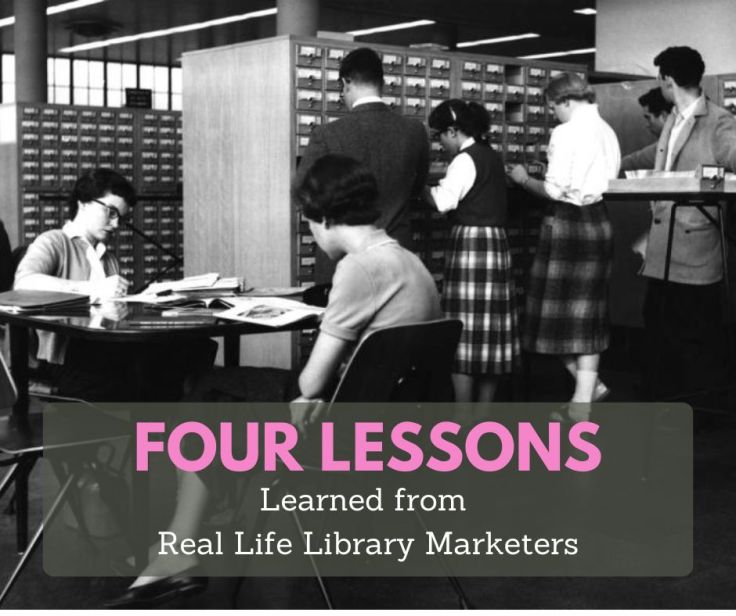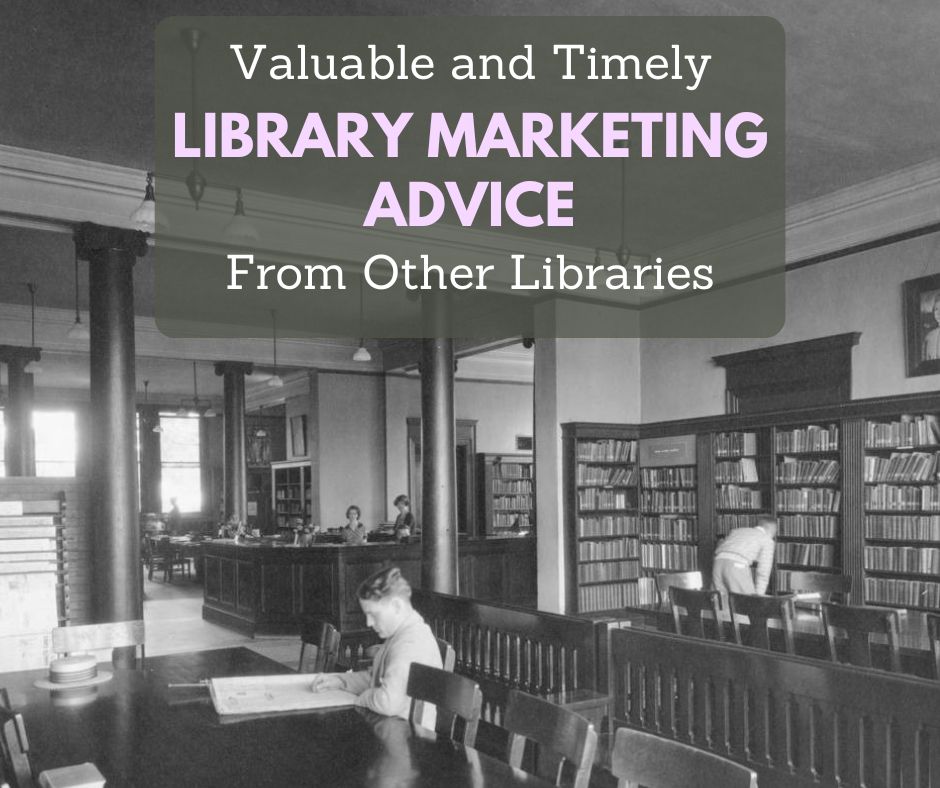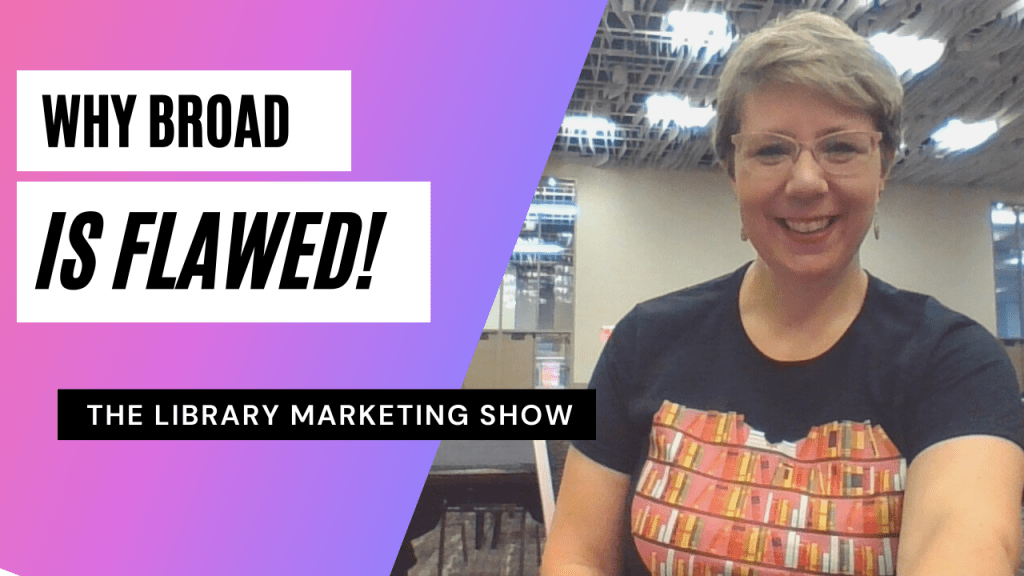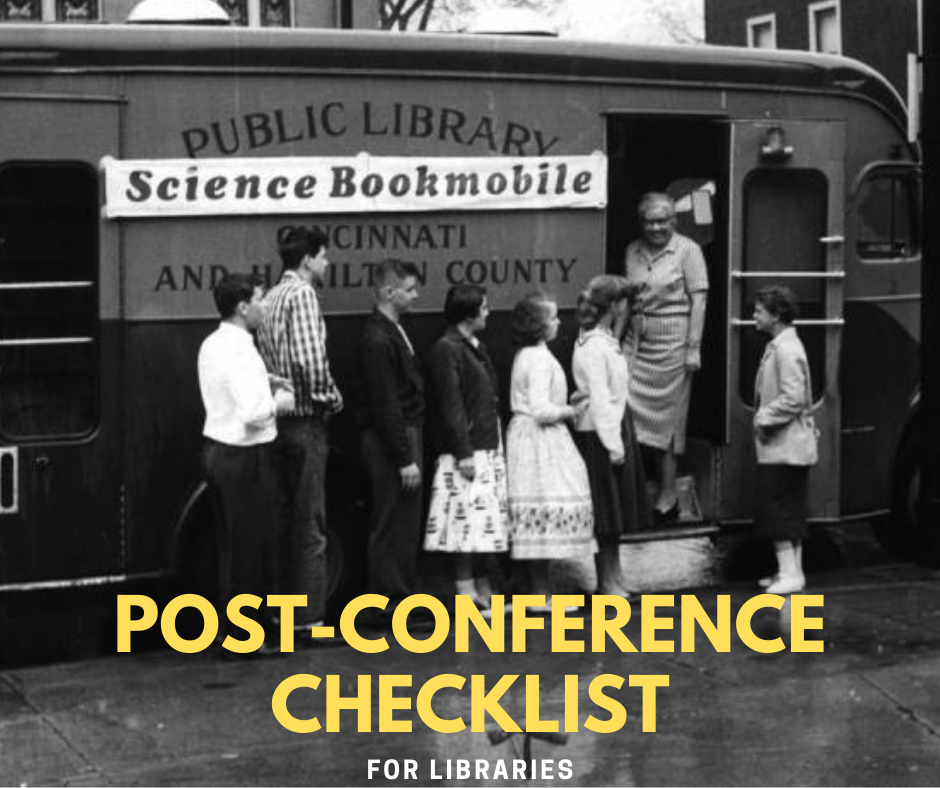
There is nothing like gathering in a room full of people who understand your struggles and your triumphs.
One of the best ways to find your library marketing soulmates… the ones who will nod sympathetically when you talk about how hard it is to get engagement on your social media posts or how your co-workers expect you to make a flyer for every single program is at a conference.
What topics do you want to see covered at conferences this year?
That’s why I’m putting out my annual list of the best conferences for library promotions a little early this year. I wanted to give you more time to plan.
Here’s what you need to know about this list.
- The conferences have a robust selection of sessions specifically centered around marketing and promotions. Many conferences on this list are not specifically designed for libraries. But if the conference will teach you techniques or new concepts that you can adapt to your library work, I’ve included it.
- The conferences offer high value for the price. I am keenly aware of budgetary constraints for libraries. That means some really incredible conferences are not on the list.
- The conferences are listed in chronological order.
- Some conferences are virtual, and some are in-person. I tried to offer a range for those who wish to travel and for those who prefer to learn at home.
- Most of the conferences on my list are in North America. There is one exception. But you can scroll to the bottom of this post for a link to a complete list of library conferences around the world and non-marketing-focused state library conferences in the United States.
A final note: I’ll be at the Public Library Association Conference in Columbus, Ohio this year so if you’re going to be there too, let’s meet up!
The 11 Best Conferences in 2024 for Library Marketing and Promotions
Computers in Libraries 2024
In-person event, March 12-14, 2024, in Arlington, Virginia
Price: Ranges from $249 to $929 depending on how many days you wish to attend and whether you want to participate in workshops.
The Communities track is marketing and outreach-focused. There are also sessions on the future of libraries and the impact of AI.
American Copy Editors Society
In-person event, April 4-5, 2024, in San Diego, California
Price: $775
This conference boosts an impressive program packed with sessions that will sharpen your writing skills for all kinds of library promotion including tools for fact-checking, accessibility, creativity, and how to build an in-house style guide.
Digital Marketing Conference Series
47 separate in-person and virtual events happening between April and October 2024 across the globe
Price: Varies by location. You’ll generally pay around $600 for the bottom-tier in-person pass and about $200 for the virtual pass.
This series includes sessions on customer engagement, social media marketing, video marketing, web analytics, email marketing, content marketing, search engine optimization, geo-targeting, and much more. Each event has its own website and agenda so you can pick the right session for you.
Digital Summit Series
8 separate in-person events between April and December 2024 across the USA.
Price: $495 for a main conference pass
This conference covers content, social media, email, SEO, analytics, and strategy. They also got me with this line from their website: “Size and budget shouldn’t lock you out of good marketing.” The cost is reasonable and the programs all apply to library marketing work. They’ve even got a pre-filled email to send to your supervisor, making the case for attendance. And with 8 conferences across the U.S., there’s bound to be one near to you.
International Public Library Fundraising Conference
In-person event, June 9-11, 2024, in Washington, DC
Price: $372.60
This conference is for anyone assigned to marketing for fundraising at a library. Topics include effective direct mail and digital fundraising strategies, messaging in today’s political and social climate, how to turn fundraising challenges into successes, engaging your board, and Library Giving Day ideas.
Marketing Analytics Conference
Virtual event, June 18, 2024
Price: Free
Every marketer needs to know how to analyze data. And although there’s not a program listed yet, a free conference from the American Marketing Association that promises to deep dive into trends, strategies and innovations in marketing analytics alongside industry leaders and experts is a must. I’m registered!
Podcast Movement
In-person event, August 19-22, 2024, in Washington, DC
Price: Early bird prices range from $239-$539, depending on whether you want access to recordings and VIP status
I’ve added this conference because so many libraries are now producing podcasts. With more than 100 sessions and the opportunity to network with other podcasters, plus a very affordable ticket price, I think this conference is definitely worth your consideration.
Online News Association Annual Conference
In-person event, Sept. 18-20, 2024, in Atlanta, Georgia
Price: Prices are not yet released but last year they charged $795 for the in-person conference and $350 for a virtual pass with access to session recordings.
I bet you’re thinking, “What is this conference doing on the list?” Last year’s program was packed with sessions that would be extremely valuable for library marketers, especially if one of your 2024 goals is to improve your writing and storytelling and increase press coverage of your library. If they offer the virtual pass again, I think it’s worth your consideration. Sign up for their conference newsletter to get notified when registration opens and when the program for 2024 is set.
Guru Conference
Virtual event, October 16-17, 2024
Price: Free
A favorite of my team at NoveList, I’m thrilled that the date doesn’t conflict with the Library Marketing and Communications conference this year. This free virtual event is packed with tips for email marketing and advice for promotions. It’s energetic and usually has celebrity keynotes (last year was Martha Stewart!). There are no recordings, so you must set aside time to watch the sessions live. Block your calendar now.
Internet Librarian
Virtual event, October 22-24, 2024
Price: TBD but last year it ranged from $199-$329
An incredibly affordable option for library staff, especially if you don’t have a travel budget. The conference usually includes sessions on social media management, video marketing, and podcasting. Registration is not yet open but you can sign up to get email updates on the event.
Library Marketing and Communications Conference
In-person event, November 12-13 in St. Louis, MO
Price: TBD
If you have to pick one conference to attend this year, make it this one. This is an amazing opportunity to learn so much about marketing, communication, public relations, social media, and outreach in academic, public, and special libraries. The sessions explore issues that are important for this niche of library work. The conference includes time for attendees to network and discuss mutual challenges. Registration opens later this year. Sign up for their mailing list on the website to get more information. Join their Facebook group to start networking right now. I will be there!!!
More library conferences
For more library conferences across the U.S. and abroad, visit Information Today.
PS You might also find this helpful
10 Tips to Make The Most of Your Next Library Marketing Conference
Subscribe to this blog and you’ll receive an email whenever I post. To do that, enter your email address and click on the “Follow” button in the lower left-hand corner of the page. You can also follow me on the following social media platforms:








